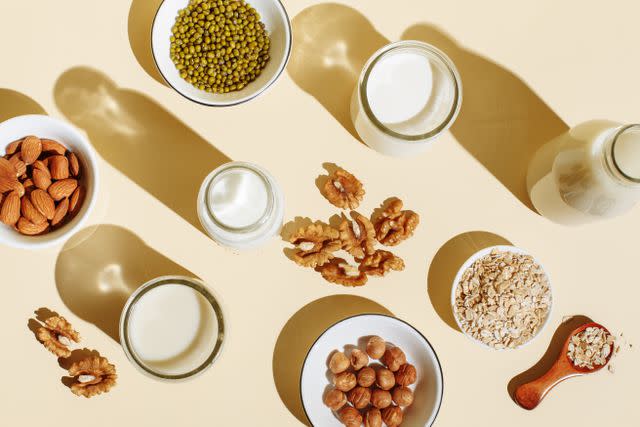Most Plant-Based Milks Have Less Protein, Calcium, and Vitamin D Than Cow's Milk, Study Finds
That’s not to say they’re bad for you! It’s all about reading your labels and getting those nutrients elsewhere.
If you’re an oat-milk-latte, almond-milk-in-your-cereal, soy-milk-smoothie lover, you’re in luck. There are literally hundreds of non-dairy milk options available at U.S. supermarkets and online grocery retailers these days. Whether you're vegan or allergic, sensitive, or simply taste-averse to dairy, you were born in the right era, and you’ll never have to go without a cold and creamy milk-like option.
Related: Between Dairy and Non-Dairy Yogurts, These Are Your 6 Healthiest Options, According to New Research
But there’s one thing to note: While non-dairy, plant-based milks can mimic the experience, consistency, and even taste of dairy milk, they’re not all nutritionally equivalent to cow’s milk. Some non-dairy options do contain their own list of healthy micronutrients (like plant compounds unique to plant-based sources—which cow’s milk doesn’t provide), and others are fortified to provide the same key nutrients that cow’s milk does.

Tanja Ivanova/Getty Images
Non-Dairy vs. Dairy Milk Nutritional Analysis
However, according to a nutritional analysis from the University of Minnesota, only 12 percent of the 237 non-dairy milk substitutes assessed, “contained comparable or greater amounts of all three nutrients studied: calcium, vitamin D, and protein,” a news release reports. So if you’ve been relying on your favorite plant-based substitute as a nutritional one-to-one swap for regular milk—not so fast.
Traditional cow’s milk has long been an important source of protein, as well as calcium and vitamin D, in the American diet. In fact, the 2020-2025 Dietary Guidelines for Americans has labeled the underconsumption of calcium and vitamin D as a public health concern. So given the popularity of non-dairy milks, many of which lack some or all of these micronutrients, there’s even more of a need to get enough of them from other healthy food sources (which is entirely possible!).
The good news, per the assessment, is that the majority of almond-, oat-, and soy-based milks studied (69 percent) are fortified with calcium and vitamin D (but not protein as well), so it’s not difficult to find them. And “when [these plant-based options] are fortified with calcium and vitamin D, the level of fortification is similar to dairy milk,” according to the study’s abstract.
However, the abstract does add, “few plant-based milk alternative products match dairy milk levels of protein.” Something to be aware of when grocery shopping!
Related: After a Lengthy Debate, Soy and Nut Milks Can Officially Be Called 'Milk,' FDA Says
What does this mean for non-dairy milk drinkers?
Abigail Johnson, PhD, RD, assistant professor and associate director of the University of Minnesota School of Public Health Nutrition Coordinating Center, presented the analysis findings at Nutrition 2023, an annual research and education summit by the American Society for Nutrition.
“Based on these findings, consumers should look for plant-based milk alternative products that list calcium and vitamin D as ingredients,” Johnson says in the press release, adding the recommendation: “They may also want to consider adding other sources of calcium and vitamin D to their diets.”
Key Takeaways:
Read non-dairy milk product labels carefully to find ones that have been fortified with calcium, vitamin D, and/or protein.
Bump up your protein intake with more healthy sources of protein (lean meat, eggs, fish/seafood, hard cheeses), including natural plant-protein sources (beans, nuts, seeds, lentils, chickpeas, whole grains, peas, tofu/tempeh, edamame, and more!).
Prioritize calcium-rich foods: yogurt, cheeses, cottage cheese (for dairy eaters); tahini, sardines, beans, dark leafy greens like spinach and kale, and, again, fortified non-dairy milks and yogurts.
Eat your vitamin D in mushrooms, fatty fish like salmon, fortified non-dairy milks and soy products like tofu.
Related: 6 Foods and Drinks That Support Bone Health (Besides a Glass of Milk)
For more Real Simple news, make sure to sign up for our newsletter!
Read the original article on Real Simple.

 Yahoo Sport
Yahoo Sport 





































